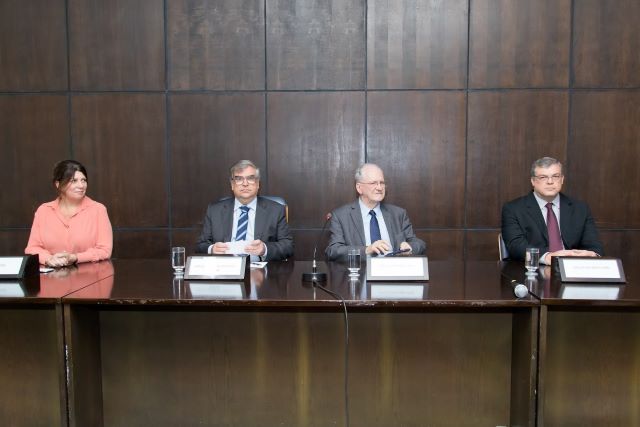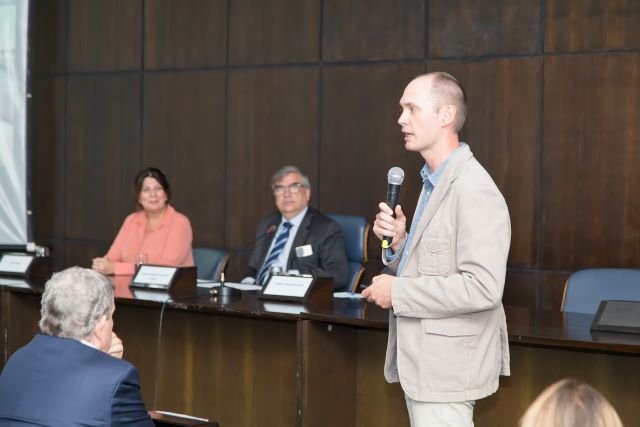


Agriculture is responsible for about 20% of global greenhouse gas emissions (photo: Eduardo Cesar/Pesquisa FAPESP magazine)
Published on 12/04/2023
By André Julião in Piracicaba | Agência FAPESP – Reducing greenhouse gas emissions and increasing carbon sequestration in agriculture while raising food, fiber and energy productivity is the challenge posed by the Center for Carbon Research in Tropical Agriculture (CCARBON), hosted by the University of São Paulo’s Luiz de Queiroz College of Agriculture (ESALQ-USP) and officially launched on November 17 in Piracicaba, São Paulo state.
CCARBON is one of five new Research, Innovation and Dissemination Centers (RIDCs) announced by FAPESP in March and selected from among 38 proposals submitted to a call issued in 2021 (read more at: agencia.fapesp.br/41089).
“This proposal was selected in light of the quality of the research already done here and the significance of the subject matter at a time when we’re moving into a green transition, alongside the digital transition,” said Marco Antonio Zago, President of FAPESP, during a ceremony held at ESALQ-USP.
Carlos Eduardo Pellegrino Cerri, CCARBON’s Principal Investigator, recalled that agriculture is responsible for about 20% of global greenhouse gas emissions. In Brazil, however, the proportion is 27%, he said, noting that the government has pledged to achieve a 37% reduction in all greenhouse gas emissions by 2025, and a 43% reduction by 2030.
“We want to cut emissions and also capture more carbon in the soil. Agriculture can be part of the solution to the problem, and Brazil has a key role to play in that respect,” Cerri said.
The new center will develop innovative solutions and strategies to mitigate emissions and establish best agricultural management practices. According to Cerri, the existing solutions were mostly designed for countries in the northern hemisphere with temperate climates and do not necessarily work in the Global South, where tropical agriculture is important.
“Our ambition is to be a world-class center. We want what we create here to be usable by other tropical countries, and even by the United States and Europe,” said Maurício Roberto Cherubin, CCARBON’s Head of Research.

Thais Maria Ferreira de Souza Vieira, Director of ESALQ-USP; Carlos Gilberto Carlotti Junior, Rector of USP; Marco Antonio Zago, President of FAPESP; and Carlos Eduardo Pellegrino Cerri, Principal Investigator for CCARBON (photo: Gerhard Waller/ESALQ-USP)
Commodity
Pedro Henrique Santin Brancalion, the center’s Innovation Director, noted that carbon is becoming a commodity, and one of the most valuable. In this context, Brazil has similar potential to that of the Arab countries in fossil fuels.
“We can help solve a problem faced by humanity. We must be ambitious because of its scale, so innovation is critical. One of the advantages is that increasing the stock of carbon also increases production, and restored native vegetation plays a key role in ecosystem services,” he said.

Pedro Brancalion, Director of Innovation, CCARBON (photo: Gerhard Waller/ESALQ-USP)
CCARBON is being structured to act as a bridge between discoveries and their applications in the sector via incentives for innovative small enterprises, he explained, adding that Piracicaba is the second-ranking city in Brazil in terms of the number of agribusiness technology startups, or agtechs.
For Thais Maria Ferreira de Souza Vieira, a researcher at CCARBON and Director of ESALQ-USP, in addition to technology transfer, “our role as a university is to take this knowledge to society and educate citizens to make conscious choices”.
Carlos Gilberto Carlotti Junior, Rector of USP, noted that his administration has established five research centers, two of which are agricultural, inspired by the Research Center for Greenhouse Gas Innovation (RCGI), an Engineering Research Center (ERC) set up by Shell and FAPESP at the university’s Engineering School (POLI-USP).
“The Office of the Rector provides an initial stimulus, and they have to be self-sustaining within ten years,” he said, adding that CCARBON’s cross-border partnerships are aligned with the university’s internationalization strategy. For example, it recently signed an agreement with France’s CNRS to establish an international research center (read more at: agencia.fapesp.br/40937).
Carlotti also noted that USP is negotiating with Germany’s Max Planck Institute to set up a unit of the German scientific research institution on a campus in São Paulo.
Source: https://agencia.fapesp.br/50375